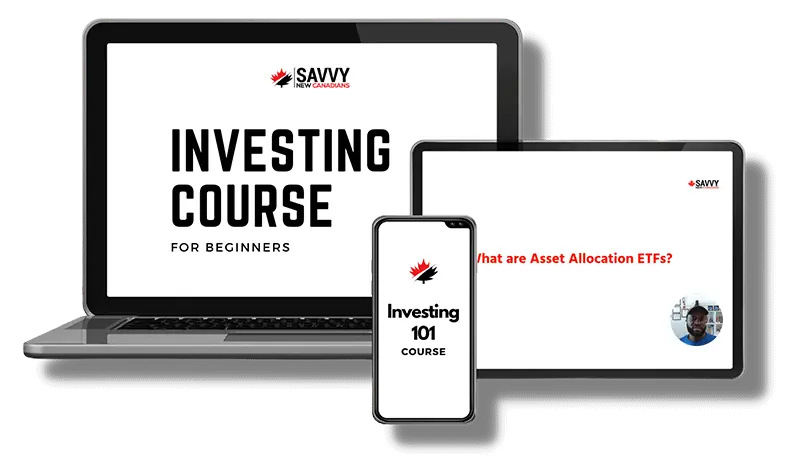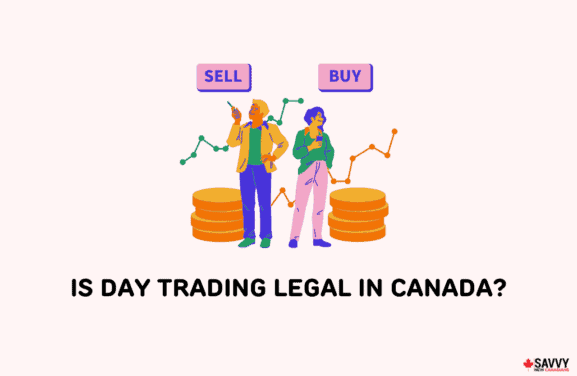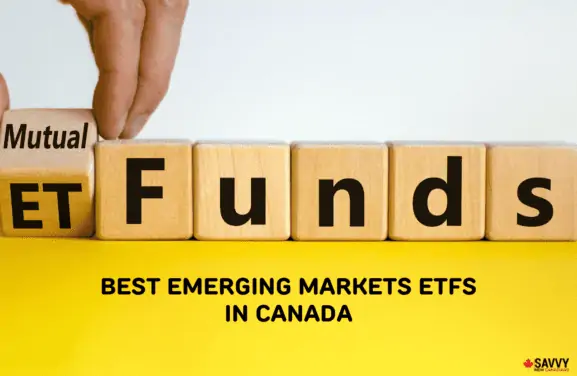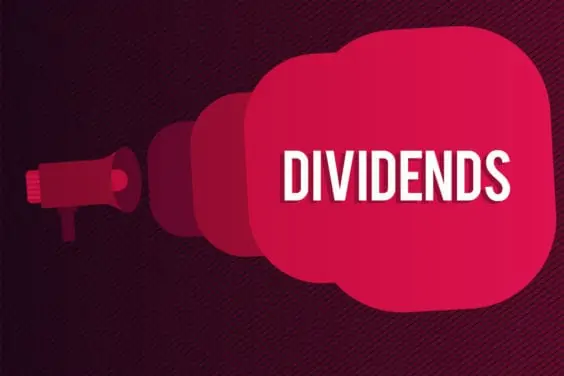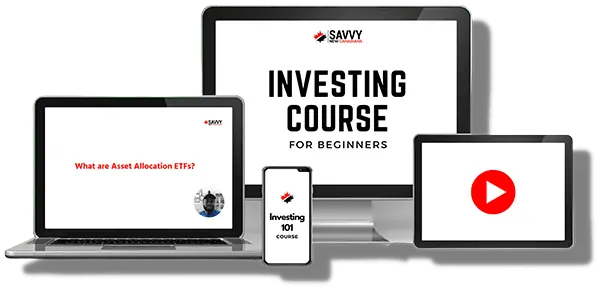ETFs or Exchange Traded Funds are known for the ability to combine diversification and convenience to your portfolio in one tradable asset.
These funds offer a basket of assets at a lower management cost than traditional mutual funds. ETFs can track sectors, indices, and even total stock markets.
Many investors who do not have the time to track individual companies will build a portfolio of ETFs. What many people are unaware of is that companies like iShares and Vanguard create full all-in-one equity portfolios in a single ETF.
These ETFs are referred to as Equity ETFs or All-Equity ETFs. This article will discuss two of the best Equity ETFs in Canada: iShares’ XEQT and Vanguard’s VEQT.
Understanding Equity ETFs
As their name suggests, equity ETFs provide investors with an all-equity portfolio. This means that they only hold a variety of different stocks.
You will not find other assets like bonds or futures contracts in an equity ETF. The goal is to seek long-term capital growth by investing in a broad range of stocks through underlying funds.
Since these equity ETFs typically hold thousands of stocks, the allocated weight to each is minimal. These ETFs also pay out a distribution to shareholders and are generally considered lower-risk investments.
The two ETFs in question also provide Canadian investors with exposure to global markets. It is an excellent way for Canadians to avoid paying foreign exchange fees for buying American or international stocks.
XEQT vs VEQT Fees
When discussing any ETFs, one of the first things to consider is the fees you pay for owning these shares. Every ETF has a management fee and an MER or Management Expense Ratio.
The MER is usually seen as the true ‘cost’ of owning the ETF as it encompasses the management fees. Here is a comparison of the fees for XEQT and VEQT as of March 2023:
| ETF Name | Management Fee | MER |
| XEQT | 0.18% | 0.20% |
| VEQT | 0.22% | 0.24% |
As you can see, XEQT has slightly lower fees. What does a 0.20% MER mean? For every $10,000 you have invested in XEQT, the fees will be $20.00 per year.
XEQT vs VEQT Returns
How have XEQT and VEQT performed? Both equity ETFs were established in 2019, so we do not have a long track record for either fund. Here is a comparison of how each has performed thus far on an annual basis:
| ETF Name | 2020 Returns | 2021 Returns | 2022 Returns |
| XEQT | 11.71% | 19.57% | -10.93% |
| VEQT | 11.29% | 19.59% | -10.78% |
The two funds have very similar returns on an annual basis. Here is a comparison of how each has performed on a cumulative basis:
| ETF Name | YTD | 1-Year | 3-Years | Inception |
| XEQT | 5.08% | -0.76% | 32.38% | 35.84% |
| VEQT | 5.13% | -1.16% | 31.94% | 43.5% |
Overall, VEQT has provided slightly better returns since its inception. VEQT was also established about eight months earlier than XEQT.
XEQT vs VEQT Holdings
As we already know, since both of these are equity ETFs, they will hold a portfolio of 100% stocks. We also know that rather than holding thousands of individual stocks, these ETFs hold a portfolio of other ETFs. Here is a comparison of each fund’s underlying holdings:
| ETF Name | Number of Holdings | Total number of Stocks |
| XEQT | 4 | 9,291 |
| VEQT | 4 | 13,602 |
VEQT holds more than 4,000 more stocks than XEQT. Both funds have a significant weight towards both US and Canadian-listed stocks. Here is the geographic breakdown for each ETF:
Top Regional Allocations
| Country | XEQT Allocation | VEQT Allocation |
| United States | 43.88% | 42.5% |
| Canada | 23.54% | 30.2% |
| Japan | 5.91% | 4.5% |
| United Kingdom | 3.75% | 3.1% |
| France | 2.74% | 2.0% |
| Germany | 2.02% | 1.5% |
| China | 1.70% | 2.5% |
There are other markets included, but these are the largest weighted allocations in each fund. Notably, VEQT has a larger weight in Canadian and Chinese stocks.
Here are XEQT’s Holdings:
| Asset Name | XEQT Weighted Allocation |
| iShares Total US Stock Market ETF (ITOT) | 44.54% |
| iShares MSCI EAFE IMI Index (XEF) | 25.49% |
| iShares S&P/TSX Capped Composite Index ETF (XIC) | 24.38% |
| iShares Core MSCI Emerging Markets ETF (IEMG) | 5.00% |
Here are VEQT’s Holdings:
| Asset Name | VEQT Weighted Allocation |
| Vanguard US Total Market Index ETF (VUN) | 42.71% |
| Vanguard FTSE Canada All Cap Index ETF (VCN) | 29.97% |
| Vanguard FTSE Developed All Cap EX North America Index ETF (VIU) | 19.99% |
| Vanguard FTSE Emerging Markets All Cap Index ETF (VEE) | 7.29% |
Both equity ETFs also hold a minimal amount of both Canadian and US Dollars to hedge against currency fluctuations.
XEQT vs VEQT Dividends
These equity ETFs are primarily focused on long-term capital growth. If you are seeking dividends, you might want to look at other, more income-oriented ETFs. Here are the dividend facts for each ETF:
| ETF Name | Distribution Yield | Distribution Frequency |
| XEQT | 1.41% | Quarterly |
| VEQT | 2.00% | Annually |
The primary difference between XEQT and VEQT is the frequency of distributions. XEQT pays out quarterly, while VEQT only pays out once per year.
Pros and Cons of XEQT vs VEQT
XEQT
Pros
- Lower MER than VEQT
- Quarterly dividends
- Diverse market allocation of stocks
Cons
- An all-stock portfolio can be risky during market downturns
- A lower dividend yield than VEQT
VEQT
Pros
- Almost 4,000 more stocks than XEQT which adds more diversification
- Has outperformed XEQT since inception
- 80% allocation to large-cap stocks
Cons
- Higher MER than XEQT
- Annual distributions compared to quarterly
- Higher allocation to Canadian stocks might not be enough diversification for Canadian portfolios
XEQT vs VEQT: Which Equity ETF is Better?
Both equity ETFs provide excellent and instant diversification for Canadian portfolios. Since both XEQT and VEQT have provided similar returns, XEQT’s lower MER and quarterly distributions could make it a more attractive investment.
But if you want greater diversification with over 4,000 more stocks, then VEQT could be the better bet.
How To Buy XEQT and VEQT in Canada
You can buy either ETF easily using some of the best brokerage platforms in Canada:
Wealthsimple Trade

Trade stocks, ETFs, and options
Excellent trading platform for beginners
Deposit $150+ to get a $25 cash bonus
Transfer fees waived up to $150
Questrade

Trade stocks, ETFs, options, FX, bonds, CFDs, mutual funds, etc.
Get $50 trade credit with $1,000 funding
Low and competitive trading fees
No quarterly inactivity fees
Access to advanced tools and trading data
Top platform for advanced traders
Transfer fees waived
Related:
